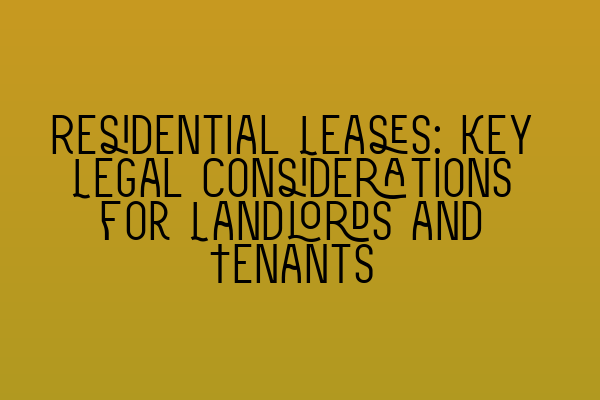Residential Leases: Key Legal Considerations for Landlords and Tenants
Welcome to SQE Property Law & Land Law! As solicitors specializing in property law, we understand the importance of having a comprehensive understanding of residential leases. Whether you are a landlord or a tenant, it is vital to be aware of the key legal considerations that govern this type of agreement. In this blog post, we will explore some of the essential aspects of residential leases and provide you with valuable insights to protect your rights and interests.
1. Understanding the Basics of Residential Leases
A residential lease is a contract that outlines the terms and conditions of a rental agreement between a landlord and a tenant. It sets out the rights and responsibilities of both parties and establishes the duration of the tenancy. It is crucial to ensure that the lease is legally enforceable and complies with all relevant laws and regulations.
To start with, it is essential to have a well-drafted lease that clearly defines the roles and obligations of both the landlord and the tenant. This includes details such as the length of the tenancy, the amount of rent payable, and the responsibilities for maintenance and repairs.
2. Importance of Clear and Precise Lease Clauses
To protect their interests, landlords and tenants should pay attention to the specific lease clauses that outline important terms and conditions. These clauses cover various aspects, such as:
a) Rent Payment Terms: The lease should clearly state the amount of rent, the due date, and the acceptable method of payment. It should also mention any penalties or consequences for late or missed payments.
b) Maintenance and Repairs: Both parties must understand their responsibilities regarding maintenance and repairs. The lease should specify who is responsible for what, whether it is the landlord or the tenant. This includes regular upkeep, repairs, and compliance with health and safety regulations.
c) Right of Entry: The lease should outline the circumstances under which the landlord can enter the property and the notice period required. This ensures that the tenant’s privacy is respected and that the landlord can carry out necessary inspections or repairs.
3. Legal Obligations: Landlord and Tenant Responsibilities
Both landlords and tenants have legal obligations that they must fulfill throughout the tenancy. It is crucial to be aware of these responsibilities to avoid disputes or legal complications.
a) Landlord Responsibilities: Landlords are legally obliged to provide a safe and habitable living environment for their tenants. This includes maintaining the property in good condition, ensuring compliance with health and safety regulations, and addressing any repairs promptly. Landlords must also protect the tenant’s deposit by registering it with a government-approved tenancy deposit scheme.
b) Tenant Responsibilities: Tenants are responsible for paying the rent on time, maintaining the property in a reasonable state of cleanliness, and reporting any maintenance issues promptly. Tenants must also comply with the terms outlined in the lease, such as restrictions on subletting or making alterations to the property without permission.
4. Termination and Renewal of Residential Leases
Residential leases have a specific duration, known as the fixed term. Once the fixed term expires, both the landlord and the tenant have options regarding termination or renewal of the lease.
a) Termination: If either party wishes to terminate the lease before the fixed term expires, there may be specific notice periods and procedures that must be followed. These details should be clearly outlined in the lease agreement to avoid any confusion or disputes.
b) Renewal: If both the landlord and the tenant wish to continue the tenancy after the fixed term, they can enter into a new lease agreement or opt for a periodic tenancy. It is important to address the renewal or extension of the lease in a timely manner, as failure to do so may result in unintended consequences.
5. Seeking Professional Legal Advice
Residential leases can be complex, and it is advisable to seek professional legal advice to ensure that your interests are protected. At SQE Property Law & Land Law, our experienced solicitors are well-versed in residential lease agreements. We can review existing leases, draft new leases, or provide guidance on any lease-related matters.
Whether you are a landlord or a tenant, understanding the legal considerations surrounding residential leases is crucial. By being knowledgeable about your rights and responsibilities, you can navigate the complexities of these agreements with confidence.
For more information on property law and preparation courses for SQE exams, please check out our related articles:
– SQE 1 Practice Exam Questions
– SQE 1 Practice Mocks FLK1 FLK2
– SQE 2 Preparation Courses
– SQE 1 Preparation Courses
– SRA SQE Exam Dates
Get in touch with us today to discuss your residential lease needs and ensure a smooth and legally sound tenancy agreement.
